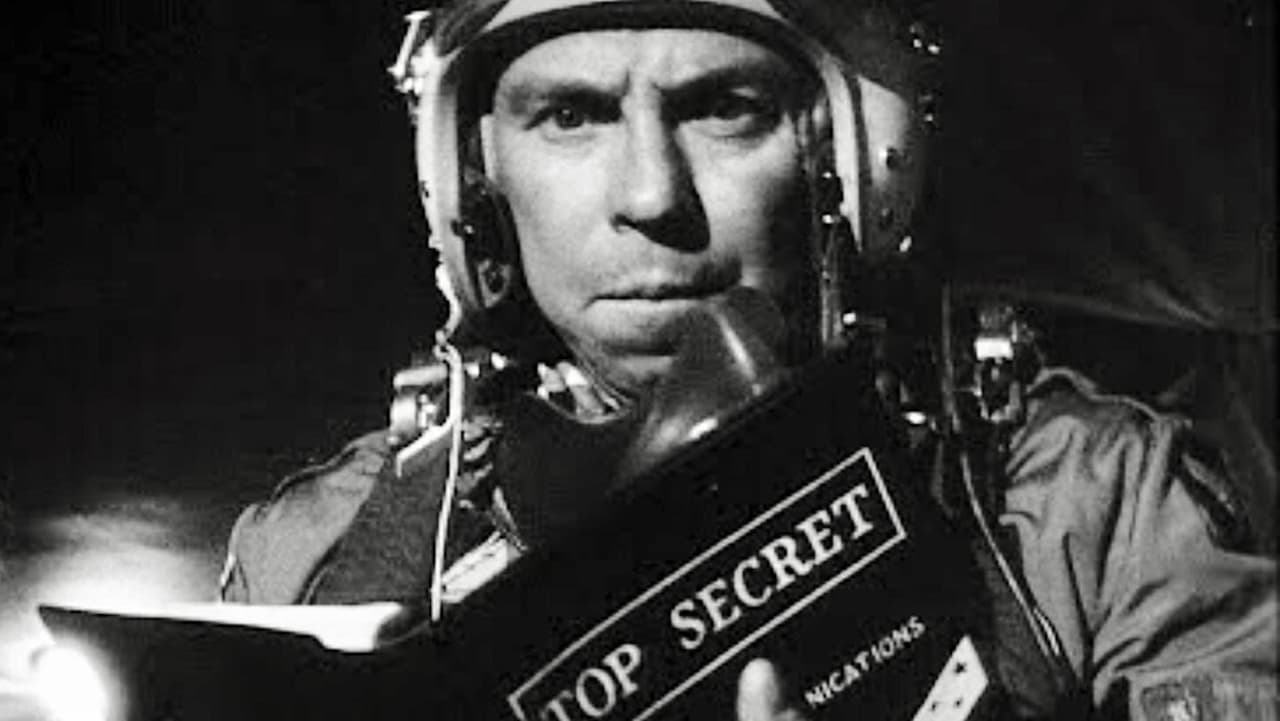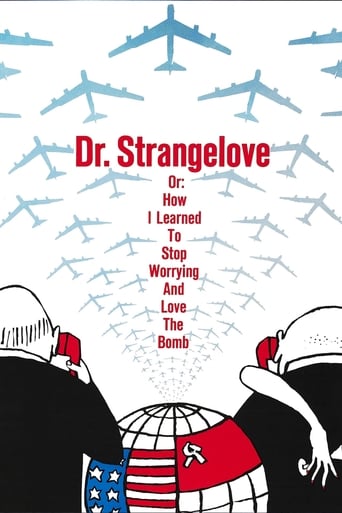

That was an excellent one.
... View MoreThis movie feels like it was made purely to piss off people who want good shows
... View MoreIt's a movie as timely as it is provocative and amazingly, for much of its running time, it is weirdly funny.
... View MoreThe film may be flawed, but its message is not.
... View MoreThe movie is hilarious from the beginning till the very end. Peter Sillers performs naturally and the trademark of Stanley Kubrick can be seen in every shot. The unique concept and the funny presentation makes this movie enjoyable.
... View MoreI never really bought into the Kubrick hype. I mean: don't get me wrong; I like all of his films very much - but to me, they all feel somewhat "over-constructed" and lack a natural flow. And then I finally got to see 'Dr. Strangelove'. Wow. What a terrific, pitch black satire. This film is so wild and mean and funny - and Peter Sellers gives THE performance of his career. Unlike in any of Kubrick's later works, there's a sense of playfulness here that gives the whole movie a crazy kind of energy; I'm guessing that Seller's love for improvisation forced Kubrick to ditch his usual perfectionism to a certain degree (and the film is all the better for it). Sharp, outrageously entertaining comedy/satire by one of the most revered directors of the past century.
... View MoreThe year is 1964. The world is starting to regain his consciousness fro WW2 and just entered the Cold War era. People are full of fear about the nuclear war. And in those days were the American film industry was launching movies about spies and Russian espionage, one of the greatest (if not the greatest) movie director of all time creates also a movie about nuclear war only this one is a bit... different. "Dr. Strangelove" is not a film that glorifies America neither Russia. Is a film that satires both this countries and the "ideology" of war in general. Peter Sellers is doing one of the best performances of his whole carrier in his triple role in the film; As group captain Lionel Mandrake a British RAF exchange soldiers who has the bad luck of being locked in the same room with the maniac that launched the attack, as President of the United States Merkin Muffley and Dr. Strangelove a former Nazi and now nuclear war expert. All three of this roles are presented excellent from one of the most talented actors ever. All of them are caricatures and are mocking the principles that each one represent. Also we have an amazing performance by George C. Scott in the role of General Buck Turgidson an aggressive and jingoist Chief of Staff. But this is not a movie which is only worthy for the performances. The topic is so modern even for today's standards that makes this film so accurate is almost scary. While it's a comedic film it is not funny. It's hilarious of course because of the characters and the amazing dialogue, but in the back of your mind you know that it's not the characters that you are laughing with but the human stupidity. And there's a lot of human stupidity in this film. Watch it, have fun, but above all think.
... View MoreNo film has so brilliantly combined broad comedy and sharp satire to the degree of "Dr. Strangelove or: How I Learned to Stop Worrying and Love the Bomb" — before or since. Stanley Kubrick made many incredible films in his lifetime, but none of them have the unique, distinctive edge of "Strangelove." The prodigious auteur made plenty of anti-war films both prior to and following this film, but it's "Strangelove's" manifold comedic gifts that elevate it to the level of classic.Anchoring the entire film is comedic genius Peter Sellers playing three vastly different characters with impeccable prowess, a feat that still has no equivalent. He loses himself complete into the roles of Captain Lionel Mandrake, President Merkin Muffley and Dr. Strangelove — it would be no surprise that if shown to large number of people without any previous knowledge of the film or Sellers, that a large percentage of that group would not realize all three characters were the same actor. He's brilliant, on a whole other level."Dr. Strangelove" imagines a ludicrous doomsday scenario in which a rogue Air Force general, Brig. Gen. Jack D. Ripper (Sterling Hayden) sends codes to initiate a massive nuclear offensive on the U.S.S.R., enacting a plan/loophole that would allow him and only him to send the codes that could abort the mission. Ripper holes himself up in his base with Mandrake, who is subjected to his wild conspiracy theories and warped world view. Meanwhile, in the Pentagon War Room, Gen. Buck Turgidson (George C. Scott) briefs the president and they weigh their options.The script, written by Kubrick, Terry Southern and Peter George (based on George's non- satirical book "Red Alert") expertly skewer the Cold War mindset at a time when nuclear war was still a paralyzing concern in the world, especially America. The strength of the writing lies in the way the characters behave and say things that are exaggerate but don't feel implausible. Turgidson talking about the benefits of killing 20 million people as opposed to 150 million has both validity and absurdity to it and proves that such drastic matters are better off out of the hands of men. And how deep the trenches of distrust and machismo go in regards to the arms race and other "races" against the Soviets is both insane and reflective of how some people probably felt.The action of "Dr. Strangelove" is largely contained to the deck of a B-52 bomber, the War Room and the military base where Ripper and Mandrake are hunkered down, so Kubrick has to flex the more subtle filmmaking muscles to tell this story in a compelling way. He balances both long takes from a single, wide angle and meticulously strung together, more suspenseful sequences with lots of close-ups. He manufactures a good amount of tension considering the humor of the entire film prevents it from being a thriller like its equally excellent (but for different reasons) cinematic peer, Sidney Lumet's "Fail- Safe." Nevertheless, "riveting" isn't among the words that best describe "Strangelove."Instead, "hilarious" and "sad" are more apt. The film's biggest action sequence takes place at the base in a battle between American forces — the ones ordered by Ripper to protect the base at all costs and the ones ordered by the president to stop Ripper. Kubrick doesn't shy from filming an all-out war scene and the result is comedy at its absolute blackest. The "Peace is Our Profession" billboard is delightful (and sadly non- contrived) irony."Dr. Strangelove" can be interpreted in the more academic sense countless ways, but it really comes down to the comedic achievement. Most films that insist on big performances and other over-the-top elements don't have the intelligence in the writing and storytelling to buoy that kind of swing for the fences. "Strangelove" does thanks to Kubrick's meticulous direction, Sellers' other-worldliness and a comedic conceit that's dead on for its time and place.~Steven CThanks for reading! Visit Movie Muse Reviews for more
... View More